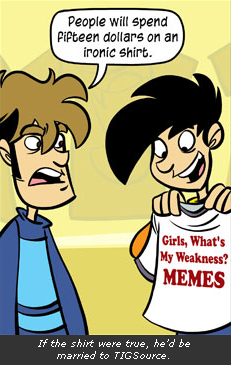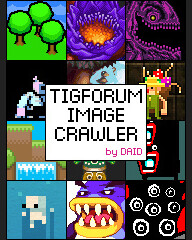Posts from ‘Business’ Category
Arrrrrrrrrrrr?
By: Derek Yu
On: August 15th, 2008
Cliff “cliffski” Harris certainly caused a stir recently when he went around the interwebs and asked software pirates why they, you know, do what they do. Harris, the developer behind Kudos, the Democracy games, and other “real life” sims, drew some interesting (if not necessarily epiphanic) conclusions from the hundreds of responses he received. Your mileage may vary.
Probably the best thing to come out of this is the resulting discussion of piracy and its roots, including a great (and slightly heated) thread on TIGForums. I’m also glad to see that Cliff is being so proactive about his troubles, going as far as to say:
That’s definitely the spirit!
(Image Source: NineInchNachosII, via Flickr)
On Braid and Pricing
By: Derek Yu
On: August 8th, 2008
The latest Penny Arcade strip is about Braid! As far as I know, this is the first indie game they’ve mentioned directly in a comic, which is pretty cool. I personally enjoy PA so I’m glad to see them promote indie games through Greenhouse, PAX, and now the strip itself.
In the post accompanying the strip, Tycho/Jerry sums up the whole pricing thing for me pretty nicely:
Well, okay, maybe not that last part. At least not until rear ends start vending Cactus Coolers or bus tickets. What a waste, otherwise!
But in all seriousness, the pricing issue is another compelling problem for developers, especially an indie who can set his or her own price. It’s especially compelling because it’s become obvious that for some people (perhaps most people?), the price somehow enters into the equation that determines a game’s inherent worth. A game that costs more than it should cost becomes a worse game. Should that be the case? Should that idea be reflected in game reviews? I suppose it depends on whether the goal of the review is to help you make a purchasing decision or whether the goal is to evaluate the merits of a video game.
In Aquaria’s case, Alec and I priced the game at $30, $10 above what I guess is the “norm” is for downloadable PC indie games is, because that’s what we felt it was worth. We considered a lot of factors, from the quality of the game, to the effort we put into it, to plain ol’ numbers like how many hours of gameplay and how many assets we created. A lot of people felt it was worth what we charged, and a lot of people didn’t, which is fine. But some people took the pricing personally before they even played the game, which I’ll never truly understand.
I think the problem is that no one knows how much a game should cost, or how we should value games. Is a good, short game better than a mediocre, long game? What are pretty graphics worth to good gameplay? What about indie versus mainstream? Like with almost EVERYTHING about games, it’s just not as clear-cut as with other types of media. The industry is too young, and it’s just plain different, too.
But to quote Tycho once more:
In the end, I don’t think it makes sense to compare games to anything other than what you think is a good game. $15 is more than most XBLA games. It’s also about how much a 2-hour movie or an ironic t-shirt costs. I guess the question is… so what? What do you guys and gals think?
TIGdb: Entries for Aquaria, Braid
See Jonathan Blow’s explanation of Braid’s pricing after the jump:
(Video posted at 1up.com.)
Xbox LIVE Community Games
By: Derek Yu
On: July 24th, 2008

New details about Microsoft’s Xbox LIVE Community Games service were released this week. Community Games allows members of the XNA Creators Club ($99/year) to sell games on XBLA after going through a peer review system.
Here are some of the important details:
– No free games! Developers using the service must charge 200 to 800 points for their games ($2.50 to $10).
– How much you charge is partially determined by your games’s file size! “Creators can chose to sell their 50 MB games for 200 Microsoft Points, or sell their larger 150 MB games for either 400 or 800 Microsoft Points.”
– Creators will receive 70% of the revenue as a baseline, although Microsoft may choose to “invest” in certain games and deduct 10-30% revenue during that time, in exchange for special promotion of the game on the console and on Xbox.com. “Certified” XBLA developers are now (as far as we know) receiving 35-45% revenue as a baseline, by comparison.
– Each game that gets sold will have a “free timed trial” built in by the system (i.e. the developer doesn’t have to rig the trial him or herself).
– The service is in beta right now, with about 60 active games (including a “musical game for babies?!”). It’s going to launch in the U.S., Canada, and parts of Europe in early 2009.
So they’re opening up the platform like Apple did with the iPod/iPhone, except that the community decides which games will sell and which games won’t. Other than the questionable file size/price thing, that sounds pretty reasonable to me!
There’s a walkthrough of the service from February on Gamasutra.
(Thanks, arrogancy!)
Microsoft to Cut Off XBLA’s “Long Tail”
By: Derek Yu
On: May 28th, 2008
Game|Life’s Chris Kohler has written an interesting article in which he discusses Microsoft’s plan to cut low-performing games on XBLA, the proverbial Long Tail of their product line.
While this does potentially mean that Yaris might finally meet its grisly end, what with its dismal Metacritic rating of 17, Chris points out that it’s also a illogical solution to XBLA’s real problem – that the interface for finding games is God-awful. And Microsoft’s rubric for deciding which games stay and which games go most definitely does not benefit either the game developers (who could easily be surviving as part of the Long Tail), or game players, who are suffering from a poor interface rather than having too many choices.
Here’s a list of currently-available XBLA titles.
You Found The Grappling Hook – PRO EDITION
By: Terry
On: April 14th, 2008
Messhof has created a PRO EDITION of You Found The Grappling Hook exclusively for Business Week Arcade, which recently featured the game. In the comments on his blog, he describes the changes:
Gleemax Sponsors the IGF
By: Derek Yu
On: February 11th, 2008
Gleemax is a new online gaming community started by Wizards of the Coast (you know, the Magic: The Gathering guys?). It’s essentially a social networking/news site focused around tabletop strategy and RPG games. It’s also, apparently, going to be an indie video game portal.
The top three winners will receive $2000, $3000, and $5000 cash prizes, respectively, along with the chance for distribution on Gleemax. The seven contestants are World of Goo, Crayon Physics Deluxe, Skyrates, Depths of Peril, Quadradius, Desktop Tower Defense, and Polarity.
This sounds very similar to Gametap’s unsuccessful involvement in last year’s IGF, although the big difference is that WotC is offering cash prizes and not advances (on 5 or 10-year distribution deals).
(Thanks, Alec!)
Simon Carless Says XBLA/PSN Games Too Cheap
By: Derek Yu
On: February 4th, 2008
Simon Carless has written a really good article on GameSetWatch where he argues that downloadable games on XBLA and PSN are too cheap to sustain themselves as a viable business model.
Also, keep in mind that in 2006, Garage Games’ Jeff Tunnell revealed that “The publicly available information on this is that the distribution fees for bringing a game to XBLA is 35 to 70 percent, depending upon participation by [Microsoft]” (via Gamespot). In other words, Tunnell implied that the “70% of revenues” is actually a ceiling… and one that you get only when you are doing the most work.
But yes, good analysis, and a must-read for anyone who’s interested in developing for consoles.
(Thanks, Alec!)
Free Lunch Design Bought by Advergaming Publisher
By: Derek Yu
On: January 31st, 2008
Free Lunch Design, the developer behind the freeware megahit Icy Tower, has been acquired by Muskedunder Interactive, a Swedish game development company and publisher that specializes in Flash “advergames.” (I really don’t like that term!) From Gamasutra:
So far, the only change is a spiffy new Flash-based website. All the FLD games are still up for download, with a promise from Alm that there will be more free games to come. I’m hoping the content of the games don’t change either!
In any case, all the best to Johan, and I hope we can see more great freeware from him in the future (it’s been a while since the last, hasn’t it?).
(Thanks, Alec!)
Undertow Creators Working on Ender’s Game… Game
By: Derek Yu
On: January 29th, 2008
Chair Entertainment, the developers behind the underwater XBLA game Undertow, have announced that they have secured the rights to Orson Scott Card’s timeless sci-fi novel “”http://en.wikipedia.org/wiki/Ender’s_Game">Ender’s Game," and will develop the first video games based on it. That’s right, video games. Chair is planning on releasing games on multiple platforms, including PC, next-gen consoles, and handhelds.
The games, which will have no tie-in to the upcoming film (when’s that coming out?), will be based on the infamous “Battle Rooms” from the book. It’s unclear how similar the games will be to one another, although Chair revealed that they would be using the Unreal Engine 3 for all of them. Even the handhelds?
I was really surprised about this, until I learned that Chair has had a long-time relationship with Card, which resulted in the award-winning sci-fi novel Empire.
What can I say? I love Ender’s Game, and I hope they do a good job with it! (But actually, what I really want to play is that game inside Ender’s holographic desk.)
(Source: Earnest Cavalli, via Game|Life)
Mount and Blade v1.0 Gets Publisher
By: Derek Yu
On: January 24th, 2008
…and a tentative release date of “Q2 2008” otherwise known as “coming this summer” in the Northern Hemisphere. (Actually, the developer is quoted as saying that they are “aiming for May” on their forums.)
Mount and Blade, the insanely awesome combat/cavalry sim by husband and wife development team TaleWorlds, has been in open beta for nigh 3 years now, and is currently at version 0.903. The official release of the game will be published by Paradox Interactive, best known for developing the Europa Universalis series of historical strategy games. Paradox is also publishing the next installment of the indie horror series Penumbra, titled Black Plague, which is coming out on February 12th!
Fortunately, this deal will not affect current players, who can still pre-purchase the game at $25 (final version $40) and look forward to new beta releases until 1.0.
Check out the official press release and also some new screenshots at Worthplaying.
(Source: Kieron Gillen, via Rock, Paper, Shotgun)









